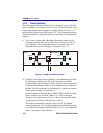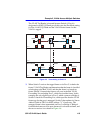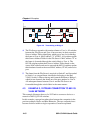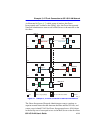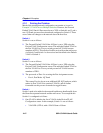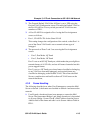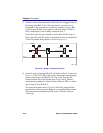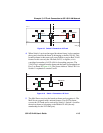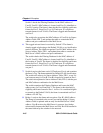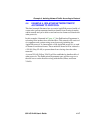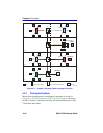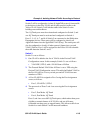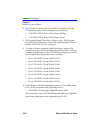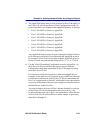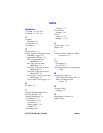
Chapter 4: Examples
4-16 802.1Q VLAN User’s Guide
Switch 1 checks the Filtering Database for the MAC address of
User B. User B’s MAC address is located, and Port 2 is identified as
User B’s location. The frame is then checked for eligibility and frame
format for Port 2. Since Port 2 is a 1Q Trunk port, it is eligible to
transmit frames for all VLANs. The frame is tagged and transmitted
out Port 2.
The switch also recognizes the MAC address of User B in its Source
Address Table, FID 1, and updates that table to contain the MAC
address and port combination of the Mail Server.
6. This tagged unicast frame is received by Switch 2. The frame is
already tagged as belonging to the Default VLAN, so no classification
needs to be done. The switch recognizes User B’s MAC address in its
Source Address Table, FID 1, and updates that table to contain the
Mail Server’s MAC address and port combination.
The switch checks the Filtering Database for the MAC address of
User B. User B’s MAC address is located, and Port 2 is identified as
the location of User B. The frame is checked for eligibility and frame
format for Port 2. Since Port 2 is a 1Q Trunk port, it is eligible to
transmit frames for all VLANs. The frame is tagged and transmitted
out port 2.
7. Switch 4 receives the frame on its 1Q Trunk port, Port 4, and examines
the frame’s Tag. The frame maintains its Default VLAN classification.
The switch also refers to its Source Address Table, FID 1, to see if it
can locate an entry for User B. User B is found to be located on Port 1.
The switch also updates its Source Address Table, FID 1, with the port
and MAC address combination for the Mail Server.
The switch examines the Filtering Database and locates the MAC
address entry for User B and Port 1. The frame is then checked for
eligibility and frame format for Port 1. As Port 1 is considered eligible
to transmit to the Default VLAN, the frame is transmitted out Port 1
without a VLAN Tag.
8. Bridge 1 receives the frame and recognizes User B’s MAC address.
The frame is forwarded to the correct port and the bridge’s Source
Address Table is updated with an entry for the Mail Server’s MAC
address. User B receives the Mail Server’s response. Any further
unicast traffic between the Mail Server and User B will be handled in
the same fashion by the switches in the network.



